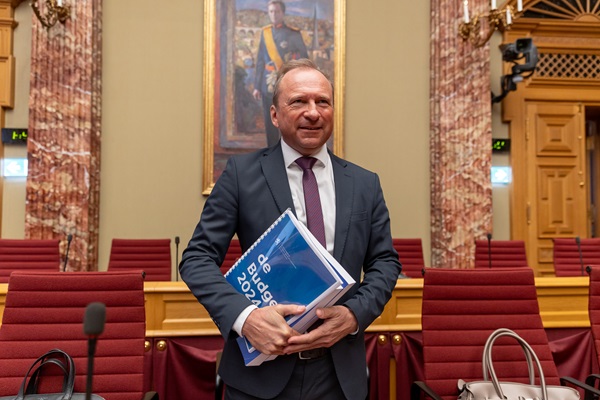 Minister Gilles Roth presenting the Luxembourg state budget on 6 March 2024;
Credit: © SIP / Julien Warnand
Minister Gilles Roth presenting the Luxembourg state budget on 6 March 2024;
Credit: © SIP / Julien Warnand
On Wednesday 6 March 2024, Luxembourg's Minister of Finance, Gilles Roth, presented the state budget for 2024 to the Chamber of Deputies under the slogan “A new momentum for our country” (Neie Schwong fir eist Land).
“With this recovery budget, the government wants to give confidence to citizens and businesses. We continue to increase the purchasing power of households. We are also strengthening the competitiveness of businesses. With this budget, we support the construction of a modern and attractive country by investing primarily in promising areas for Luxembourg. With this solid and united budget, we are preparing the ground to emerge head-on from the crises of recent years,” explained Minister Roth.
The following has been taken from a press release by the Ministry of Finance.
A difficult geopolitical and macroeconomic context
This budget takes place in a difficult geopolitical context. Many conflicts, like the war in Ukraine and the Israeli-Palestinian conflict, directly impact our economic fundamentals.
After a year of recession in 2023 (-1% of GDP), Statec expects timid growth in Luxembourg's GDP (+2%) in 2024 compared to only 0.6% in the euro zone.
The inflation rate should stand at 2.2% in Luxembourg. The unemployment rate for its part continues to rise to reach 5.9%, while employment shows an increase of only 1.3%.
Key figures: a solid basis for sustainably emerging from the crisis
Central Administration revenues and expenditures
It is against this backdrop that:
- Central Administration revenue increased by €1.8 billion (+7.1%) compared to 2023 to stand at €27.5 billion.
- Central Administration expenditure amounts to €29.4 billion (+ €2 billion or +7.6%) – in 2023, expenditure had increased by a further 11.5%.
While in 2024, the growth in spending is slowing down and approaches the growth in revenue, the government expects a reversal of the negative “scissor effect” with faster growth in revenue than in spending in 2025.
Central government deficit
For 2024, the Central Administration deficit amounts to - €1.9 billion. While the deficits of the Central Administration have widened by around €500 million each year between 2021 and 2023, this progression is slowed down for the year 2024 (+ €205 million). The opposite trend will be observed from the year 2025.
One can see that compared to the scenario presented by the General Inspectorate of Finance in October 2023, the budgetary policy of the new government succeeded in absorbing part of these deficits at the end of the year (- €3.6 billion vs. €1.9 billion).
Balance of other subsectors of public administration
Local administrations show a balance of + €62 million in 2024, while social security shows a surplus of €1.05 billion. Taking into account Statec forecasts in terms of domestic employment, the latter will decrease over the years to only reach + €261 million in 2027.
Deficit at the public administration level
At the level of public administrations (central administration, local administrations and social security), the balance shows a deficit of slightly less than €1 billion.
Public debt
Between 2018 and 2023, public debt increased continuously. It is expected to go from €22.2 billion (26.5% of GDP) in 2024 to €26.5 billion (27.3% of GDP) in 2027, therefore a flattening of public debt in terms of GDP during the legislature.
Budget priorities
The government has priority:
- support the purchasing power of citizens,
- strengthen the competitiveness of its economic fabric,
- invest in the attractiveness of the country and its social cohesion,
- act to counter the crisis in the housing and construction sector.
As a result, investments remain at a high level, reaching €4 billion for the year 2024. The emphasis will be placed on areas of the future such as mobility, digitalisation and energy transition.
Likewise, the budget constitutes a strong response to the crisis in the housing and construction sector. The new tax measures, the revision of individual aid and the new State acquisition programme for sales in the future state of completion amount to €845 million for the period 2024-2027.
Social cohesion and living together represent another priority of the government which is reflected in this budget.
- Social transfers amount to 47% of total expenditure.
- The Fund for the Future of Children will be funded to the tune of €1.5 billion to ensure the payment of family allowances, parental leave as well as back-to-school and birth allowances.
- State participation in the social security budget will increase by 12%. Expenditures from the Employment Fund reach €1.1 billion. Almost half of these credits (€499 million) are used for the payment of unemployment benefits.
Finally, the budget underlines the government's commitment to international solidarity.
- The defence effort will stand at 0.83% of GDP in 2024 compared to 0.77% initially planned. The related credit amounts to €696.3 million, of which 69.5 million is reserved for Ukraine.
- 1% of gross national income is reserved for development cooperation.
A recovery budget to give confidence
In summary, and according to the Ministry of Finance, the budget for 2024 is:
- A budget for tax and administrative relief. For citizens and businesses.
- A solidarity budget. In Luxembourg and with its foreign partners.
- A solidarity budget. In Luxembourg and with its partners.
- An investment budget. In areas of the future. Its infrastructure. Digital. The climate transition. Its future.
- An efficiency budget. In the way it spends.
- A budget for sustainable public finances.
“With this recovery budget, we are restoring confidence to businesses and our fellow citizens. It is our duty not to mortgage the future of future generations,” emphasised Minister Roth.








